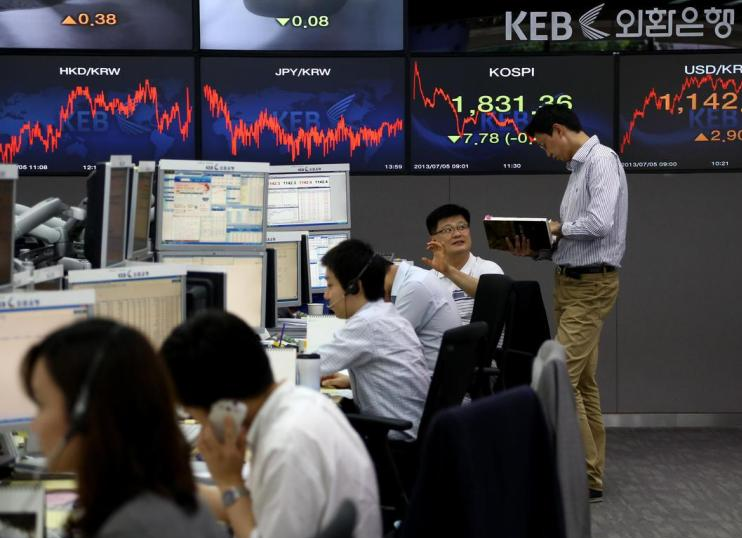
South Korean President Yoon Seok-yoon announced the lifting of emergency martial law in the early hours of Wednesday (December 4) local time after an emergency vote by 190 lawmakers in the National Assembly.
South Korea's stock market opened as usual Wednesday after a night of turmoil, but the political turmoil is still lingering. According to Bloomberg, Seoul fell more than 2% in early trading under pressure from South Korea-related assets that fell across the board overnight. Shares of Samsung Electronics, one of South Korea's biggest companies, opened down 3% before paring losses to 1.12%. Battery maker LG Energy Solution fell 2.64 percent.
SK Group, one of South Korea's largest companies with semiconductor and energy businesses, held an emergency meeting of executives Wednesday morning, Bloomberg reported. HD Hyundai, the South Korean shipbuilder, also held a meeting of senior executives where the chairman asked them to focus on foreign exchange risk management.
South Korea's Finance Ministry said Wednesday it is ready to inject "unlimited" liquidity into financial markets if needed, Reuters reported. South Korea's financial regulator noted it was ready to put 10 trillion won (about S $9.5 billion) into a stock market stabilisation fund at any time, Yonhap reported.
South Korean stocks and the won have been among the worst performing assets in Asia this year.
Overnight, U.S.-listed South Korean stocks fell, including New York exchange-traded products such as the iShares MSCI Korea ETF and the Franklin FTSE Korea ETF, all down about 1 percent. In addition, the price of bitcoin was around $96,000 in early Asian trading on Wednesday. Bloomberg reported that due to the risk aversion caused by political turmoil, the price of digital assets in South Korea has clearly diverged from the global general level.
The South Korean won, which fell to a two-year low against the dollar overnight, regained some ground after the martial law announcement.
Michael Wan, senior currency analyst at Bank of Mitsubishi UFJ (MUFG), believes political uncertainty in South Korea is likely to remain. On Wednesday, opposition parties may file a motion to impeach President Yoon Seok-hyun, whose approval ratings have hit rock bottom and who appears to have little time left in office.
"From a macro perspective, South Korea is already one of the countries most affected by Trump's proposed tariffs, and this latest development is likely to further increase the risk premium on the currency, at least until we have clarity on political stability," Wan wrote.
Bank of Mitsubishi UFJ forecasts that the won exchange rate may reach 1,450 by the second quarter of 2025, and the Bank of Korea will further cut interest rates in 2025.
Asian markets were mostly under pressure in the morning. The Sydney market opened down 0.38 per cent before extending losses to 0.41 per cent. Tokyo stocks fell 0.20% after opening almost flat, up 0.22%.
As of 9:15 am Wednesday, the Singapore benchmark Index was up 0.24 percent or 8.98 points at 3,795.11. Keppel Corp, which has commercial property assets in South Korea, fell 0.441% to 6.78 yuan in the morning before paring losses to 0.15 percent. In July 2023, Keppel Asia Macro Trends Fund IV, a unit of Keppel Corporation, joined forces with a South Korean financial institution to acquire an office building in Seoul's central business district under a promised co-investment plan.
South Korea's iShares MSCI ETF fell as much as 7.1 percent in U.S. trading. Many South Korean companies listed overseas were also affected by the incident, and their share prices fluctuated. London's Samsung Electronics fell more than 3 percent overnight, while New York-listed KT Corp, Posco and other South Korean companies all closed lower.

On January 7th local time, GameStop (GME.US) announced that the company's board of directors had approved a potential executive compensation package worth $3.54 billion, which was targeted at the company's CEO, Ryan Cohen. At the same time, this new compensation package set extremely high performance thresholds: Cohen, the CEO, needed to increase the company's market capitalization from $9.5 billion to $100 billion.
On January 7th local time, GameStop (GME.US) announced that…
According to the British media The Guardian, recently US Pr…
In today's era of deep integration of globalization and dig…
In early 2026, US President Trump forcibly took control of …
Recently, the corn market dynamics analysis released by Aus…
Donald Trump has proposed an "immediate" restriction on lar…